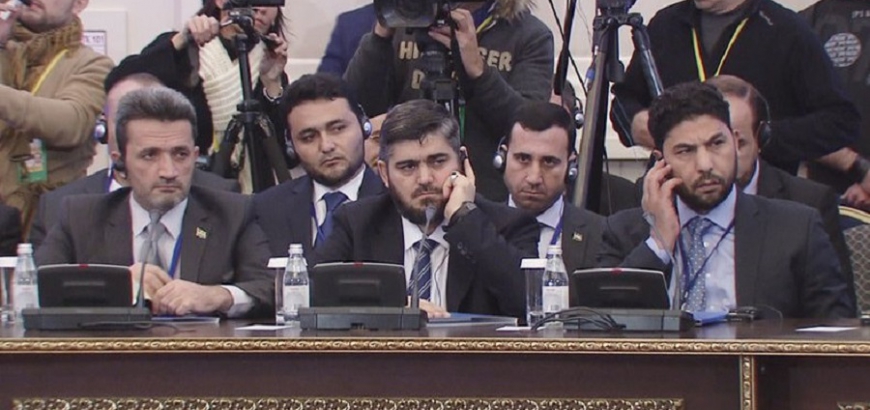Following the conclusion of the Astana talks on January 23 and 24, Russia announced that it had presented the Syrian opposition delegation with a draft proposing a new constitution for Syria, without giving details.
Dr. Zakaria Malahfaji, a political representative for the Fastaqim Union rebel group which took part in the Astana talks, told Alsouria Net that the Russian delegation had given head opposition negotiator Mohammed Alloush a copy of the draft constitution, but that Alloush had said the opposition did not want to discuss the draft and that the talks in Astana were only to solidify the ceasefire.
This is not the first time that Russia has tried to push forward a draft to advance a new constitution for Syria. Last May, it published a copy of what it said was a Russian draft for a new constitution for Syria. This was preceded by the Russian-American deal in March to also develop a new constitution.
In this context, Malahfaji told Alsouria Net that the opposition, regardless of what the Russian draft constitution contained, was not interested in reviewing it. He stressed that the current primary aim was to solidify the ceasefire.
The Syrian opposition has insisted upon solidifying the ceasefire, bringing in humanitarian aid and releasing prisoners as three basic aims without which it will not attend upcoming talks in Geneva. This is what Malahfaji confirmed, saying that if, "these matters are achieved we will move on to discuss the political process and the transitional phase. But if they are not achieved, then none of this is of any interest or consideration."
On Thursday, the Russian Sputnik news agency reported what it said was a Russian draft for a new Syrian constitution which included interesting items, such as the possibility of changing the Syrian state's borders through referendums, giving parliament the ability to remove the president, and making both Arabic and Kurdish official languages.
The Syrian opposition does not expect the current Russian position on Syria to have any positive signs. According to Malahfaji, "we can consider the Russian position to have developed a little, but it is not different than before."
He added: "For example, the Russians talk about the opposition and military forces calling them by their name, the Free Syrian Army, and they know that they do not have any relationship to the extremists and that they oppose this thinking. In addition, Moscow has sat with these forces and reached a truce with them." He stressed that this did not mean that there had been a notable positive change on the ground, noting that the ceasefire agreement was still thorny.
While Russia tries to steer the helm completely in Syria, especially after the Astana conference, its foreign minister, Sergei Lavrov, announced yesterday that he would meet on Friday with Syrian opposition members in Moscow from among those who attended the Cairo and Moscow forums and invitees from the National Coordination Committee, Qadri Jamil of the Popular Front for Change and Liberation, and the head of the Movement for a Pluralistic Society, Randa Kassis.
It seems that Russia has returned to its old efforts to dilute the Syrian opposition delegation, especially if it decides to hold Geneva talks in February, through the inclusion of controversial figures with priorities and visions for the solution in Syria that differ from the Syrian rebel groups and prominent political forces.
Malahfaji said that the Syrian street in general supported the rebel groups and the existing political forces while they were sensitive to the other factions such as those groups that Russia invited to attend the Moscow meetings on Friday "because they do not express the people's spirit."
It seems that the heat of the Astana talks has moved to northern Syria, where major fighting has erupted between Jabhat Fateh al-Sham (formerly Nusra Front) and major rebel groups, especially those who participated in the talks.
Jabhat Fateh al-Sham announced in its statements that it rejected the Astana talks and opponents say that one of the reasons for the group's major attack on the rebel groups was the recent participation in the conference, which Fateh al-Sham considered a "conspiracy against us," although the rebel groups refused to put Fateh al-Sham on the terrorist list, according to opponents.
Malahfaji told Alsouria Net that Fateh al-Sham's attack on opposition positions had been expected and said that "when (the group) sees matters proceeding toward a solution, it believes that this matter does not suit it."
He said that there were efforts to resolve the current differences and that if they failed it was possible that confrontations would develop between the parties.
On Thursday, the Saqour al-Sham brigades, Jaish al-Mujahideen, Jaish al-Islam – Idleb branch, Fastaqim Union, and Jabhat Shamiya – Western Aleppo countryside branch, announced they had joined Ahrar al-Sham as it merged with Thuwar al-Sham in an effort to repulse the broad attack on opposition groups, being carried out by the former Al-Qaeda affiliate.
Ahrar al-Sham vowed in a statement it issued on Thursday that it would consider any aggression on the groups that had joined it as a declaration of fighting which "the movement will not hesitate to repulse and to stop, whatever amount of force it requires."
This article was translated and edited by The Syrian Observer. Responsibility for the information and views set out in this article lies entirely with the author.


